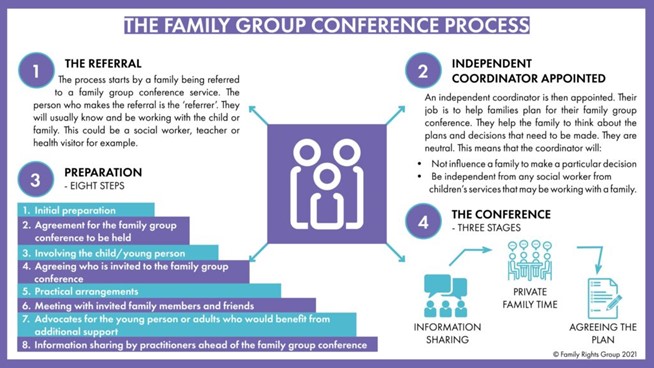A family group conference (FGC) is a family-led meeting in which the family and friends network come together to make a plan for a child.
The process is supported by an independent coordinator who helps the family prepare and chairs the meeting. Children are usually involved in their own family group conference, often with support from an advocate. It is a voluntary process and families cannot be forced into one.
The FGC process consists of a number of distinct stages which is outlined in the below diagram.
A new report from Foundations – the What Works Centre for Children & Families, suggests that over 2000 children per year could avoid going into care and instead safely remain with their families if FGCs are rolled out across England. The study, carried out by Coram and the first of its kind in the UK, found that children whose families were referred for an FGC before care proceedings began were significantly less likely to be in care twelve months after entering pre-proceedings.
In a number of upcoming online workshops taking place between June and November 2023, we will be exploring the process, principles and current use of FGCs in the UK.

We work for Family Rights Group, a charity that promotes policies and practices that keep children safe within their family and strengthen the family and community networks of those children who cannot live at home.
They campaign for families to have their voice heard, be treated fairly, and get help early to prevent problems escalating. They advise parents, grandparents, relatives and friends about their rights and options when social workers or courts make decisions about their children’s welfare. More information is available on the Family Rights Group website.
How do FGCs help?
Evidence shows that FGCs help redefine relationships between families and local authorities. They do this by:
-
Improving partnership working between family and social work services..
-
promoting high levels of participant involvement and satisfaction.
-
Recognising and building on family strengths.
-
Encouraging wider family participation.
-
Sharing information and knowledge about concerns and support.
-
Drawing on the natural resources in families.
-
Reducing contact with public services.
-
Providing a protective factor for child safety.
-
FGC is used to a similar extent among families with a minority background as in other families.
-
Involving children. Children are reported to view participation in their FGC very positively.
The current context to FGC practice
Family Rights Group introduced FGCs to the UK in the early 1990s.
They believe that families in every local authority should be offered a FGC wherever they are on the child welfare continuum and that it should be a family’s legal right to be offered a FGC before a local authority can bring care proceedings (except in emergencies) in relation to their child.
Recent research by CASCADE has shown that family group conferences are currently offered in 82% of local authorities in the UK, but how many families in any authority are offered an FGC and at what stage, is highly variable.
FGCs draw on the strength and knowledge of families to make decisions and plans for the child. They help ensure that all efforts are made to enable the child to remain safely within the family network, whether that’s wider family providing extra support to the parents or stepping forward to raise the child themselves. In doing so, the need for care proceedings or the child entering the care system can be averted.
This is reflected in the Family Rights Group response to the government’s consultation Children's social care: stable homes, built on love:
Year on year, more children are being taken into a children’s social care system marred by inadequate provision which fails too many of society’s most vulnerable young people. Meanwhile, families are not being adequately supported to keep their child safely at home, tearing precious relationships apart. The Independent Review of Children's Social Care: projected that the number of children in care in England will top 100,000 by 2032 without a significant change of course. There is extensive evidence presented in the Independent Review and elsewhere about the positive impacts of transformational practices, including investment in early help and family group conferences on outcomes for children and families.
Family Rights Group
As well as assisting parents who are struggling and averting children from becoming looked-after, FGCs can also be used when a child is already in the care system. Where a child may be able to return home, FGCs can be an effective approach in engaging the family in developing a robust support plan for both the child and their parents.

